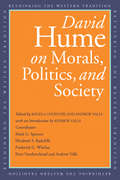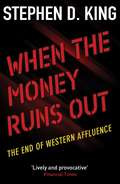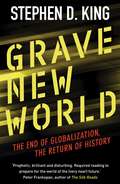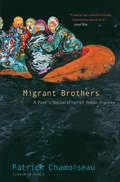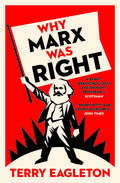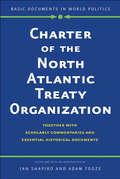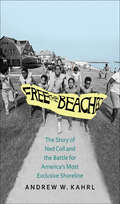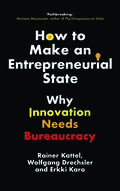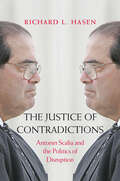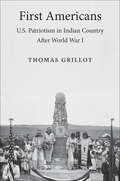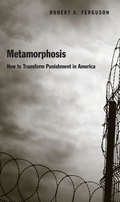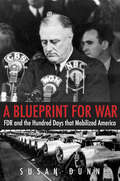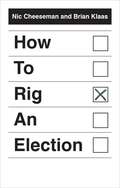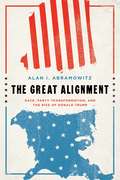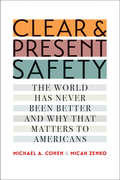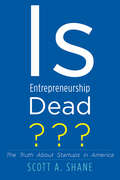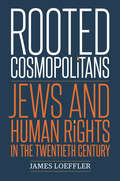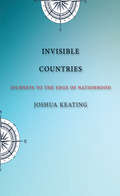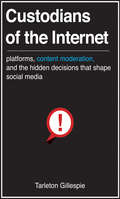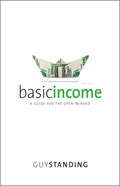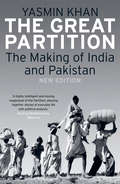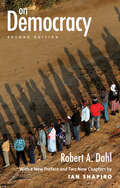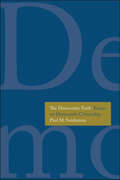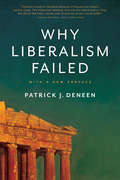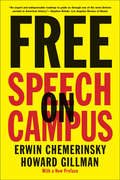- Table View
- List View
David Hume on Morals, Politics, and Society (Rethinking the Western Tradition)
by David Hume Angela Coventry Andrew VallsA compact and accessible edition of Hume’s political and moral writings with essays by a distinguished set of contributors A key figure of the Scottish Enlightenment, David Hume was a major influence on thinkers ranging from Kant and Schopenhauer to Einstein and Popper, and his writings continue to be deeply relevant today. With four essays by leading Hume scholars exploring his complex intellectual legacy, this volume presents an overview of Hume’s moral, political, and social philosophy. Editors Angela Coventry and Andrew Valls bring together a selection of writings from Hume’s most important works, with contributors placing them in their appropriate context and offering a lively discourse on the relevance of Hume’s thought to contemporary subjects like reason’s dependence on emotion and the importance of social convention in political and economic behavior. Perfect for classroom use, this volume is an invaluable companion for anyone studying an important thinker who advanced the development of moral philosophy, economics, cognitive science, and many other fields of the Western tradition.
When the Money Runs Out: The End of Western Affluence
by Stephen D. KingAn eminent economist warns that Western nations’ economic expectations for the future are way out of sync with the realities of economic stagnation and stringent steps will be required to avoid massive political and economic upheaval. “It is alarmingly difficult to disagree with Stephen King. All one can say, perhaps, is that one of the great errors of human nature—strongly displayed before the credit crunch—is the belief that a prevailing trend will continue indefinitely. The crunch is surely a reminder that what goes up must come down.”—Charles Moore, Daily Telegraph “[King] is dabbling in the financial equivalent of the horror genre. Perhaps even scarier, his is the stuff of nonfiction.”—Michael J. Casey, Wall Street Journal
Grave New World: The End of Globalization, the Return of History
by Stephen D. KingA controversial look at the end of globalization and what it means for prosperity, peace, and the global economic order Globalization, long considered the best route to economic prosperity, is not inevitable. An approach built on the principles of free trade and, since the 1980s, open capital markets, is beginning to fracture. With disappointing growth rates across the Western world, nations are no longer willing to sacrifice national interests for global growth; nor are their leaders able—or willing—to sell the idea of pursuing a global agenda of prosperity to their citizens. Combining historical analysis with current affairs, economist Stephen D. King provides a provocative and engaging account of why globalization is being rejected, what a world ruled by rival states with conflicting aims might look like, and how the pursuit of nationalist agendas could result in a race to the bottom. King argues that a rejection of globalization and a return to “autarky” will risk economic and political conflict, and he uses lessons from history to gauge how best to avoid the worst possible outcomes.
Migrant Brothers: A Poet's Declaration of Human Dignity
by Patrick Chamoiseau Matthew Amos Fredrik Rönnbäck“If justice had a Jericho trumpet, Chamoiseau would be it.”—Junot Díaz <P><P>As migrants embark on perilous journeys across oceans and deserts in pursuit of sanctuary and improved living conditions, what is the responsibility of those safely ensconced in the nations they seek to enter? <P>Moved by repeated tragedies among immigrants attempting to enter eastern and southern Europe, Patrick Chamoiseau assails the hypocrisy and detachment that allow these events to happen. Migrant Brothers is an urgent declaration of our essential interconnectedness that asserts the necessity to understand one another as part of one human community, regardless of national origin.
Why Marx Was Right
by Terry EagletonIn this combative, controversial book, Terry Eagleton takes issue with the prejudice that Marxism is dead and done with. Taking ten of the most common objections to Marxism—that it leads to political tyranny, that it reduces everything to the economic, that it is a form of historical determinism, and so on—he demonstrates in each case what a woeful travesty of Marx's own thought these assumptions are. In a world in which capitalism has been shaken to its roots by some major crises, Why Marx Was Right is as urgent and timely as it is brave and candid. Written with Eagleton's familiar wit, humor, and clarity, it will attract an audience far beyond the confines of academia.
Charter of the North Atlantic Treaty Organization: Together with Scholarly Commentaries and Essential Historical Documents (Basic Documents in World Politics)
by Ian Shapiro Adam ToozeThe most powerful military alliance in history, NATO shaped the geopolitical contours of the Cold War and continues to structure the contemporary international system. The NATO agreement is reprinted here with speeches and essential historical documents concerning the alliance’s founding and subsequent evolution. Accompanying essays by major scholars discuss debates about NATO’s evolving governance, its role in nuclear politics, and its appropriate mission during and since the Cold War.
Free the Beaches: The Story of Ned Coll and the Battle for America's Most Exclusive Shoreline
by Andrew W. Kahrl“A well-documented—and dispiriting—history of prejudice and inequality . . . An unsparing exposé of white supremacy among Northern elites.” —Kirkus ReviewsDuring the long, hot summers of the late 1960s and 1970s, one man began a campaign to open some of America’s most exclusive beaches to minorities and the urban poor. That man was anti-poverty activist and one-time presidential candidate Ned Coll of Connecticut, a state that permitted public access to a mere seven miles of its 253-mile shoreline. Nearly all of the state’s coast was held privately, for the most part by white, wealthy residents.This book is the first to tell the story of the controversial protester who gathered a band of determined African American mothers and children and challenged the racist, exclusionary tactics of homeowners in a state synonymous with liberalism. Coll’s legacy of remarkable successes—and failures—illuminates how our nation’s fragile coasts have not only become more exclusive in subsequent decades but also have suffered greater environmental destruction and erosion as a result of that private ownership.Winner of the Homer D. Babbidge Award, sponsored by the Association for the Study of Connecticut HistoryWinner of the 2019 Connecticut Book Awards, non-fiction category, sponsored by Connecticut Center for the Book“This is a life story brimming with humanity and a great antidote to life under global capitalism, in which privatization is all the rage. Andrew Kahrl’s book is sure to have a sorely needed humanizing effect on all its readers.” —Ted Steinberg, award-winning author of Gotham Unbound: The Ecological History of Greater New York
How to Make an Entrepreneurial State: Why Innovation Needs Bureaucracy
by Rainer Kattel Wolfgang Drechsler Erkki KaroA ground-breaking account which shows how the public sector must adapt, but also persevere, in order to advance technology and innovation From self-driving cars to smart grids, governments are experimenting with new technologies to significantly change the way we live. Innovation has become vitally important to states across the world. Rainer Kattel, Wolfgang Drechsler and Erkki Karo explore how public bodies pursue innovation, looking at how new policies are designed and implemented. Spanning Europe, the USA and Asia, the authors show how different institutions finance new technologies and share cutting-edge information. They argue for the importance of &‘agile stability&’, demonstrating that in order to successfully innovate, state organizations have to move nimbly like start-ups and yet ensure stability at the same time. And that, particularly in the light of the Covid-19 pandemic, governments need both long-term policy and dynamic capabilities to handle crises. This vital account explores the complex and often contradictory positions of innovating public bodies—and shows how they can overcome financial and political resistance to change for the good of us all.
The Justice of Contradictions: Antonin Scalia and the Politics of Disruption
by Richard L. Hasen“Superbly written, filled with brilliant insights . . . Both liberals and conservatives will see Scalia and his legacy in a new and more illuminating light.” —Adam Winkler, author of Gunfight: The Battle Over the Right to Bear Arms in AmericaEngaging but caustic and openly ideological, Antonin Scalia was among the most influential justices ever to serve on the United States Supreme Court. In this fascinating new book, legal scholar Richard L. Hasen assesses Scalia’s complex legacy as a conservative legal thinker and disruptive public intellectual.The left saw Scalia as an unscrupulous foe who amplified his judicial role with scathing dissents and outrageous public comments. The right viewed him as a rare principled justice committed to neutral tools of constitutional and statutory interpretation. Hasen provides a more nuanced perspective, demonstrating how Scalia was crucial to reshaping jurisprudence on issues from abortion to gun rights to separation of powers. A jumble of contradictions, Scalia promised neutral tools to legitimize the Supreme Court, but his jurisprudence and confrontational style moved the Court to the right, alienated potential allies, and helped to delegitimize the institution he was trying to save.“Absorbing . . . [a] book that, at least for this reader, shed new light on the law and how it is made, interpreted, and applied.” —Los Angeles Review of Books
First Americans: U.S. Patriotism in Indian Country after World War I
by Thomas GrillotThe little-known story of how army veterans returning to reservation life after World War I transformed Native American identity. Drawing from archival sources and oral histories, Thomas Grillot demonstrates how the relationship between Native American tribes and the United States was reinvented in the years following World War I. During that conflict, twelve thousand Native American soldiers served in the U.S. Army. They returned home to their reservations with newfound patriotism, leveraging their veteran cachet for political power and claiming all the benefits of citizenship—even supporting the termination policy that ended the U.S. government&’s recognition of tribal sovereignty.
Metamorphosis: How to Transform Punishment in America
by Robert A FergusonIn the past few years, the need for prison reform in America has reached the level of a consensus. We agree that many prison terms are too long, especially for nonviolent drug offenders; that long-term isolation is a bad idea; and that basic psychiatric and medical care in prisons is woefully inadequate. Some people believe that contracting out prison services to for-profit companies is a recipe for mistreatment. Robert Ferguson argues that these reforms barely scratch the surface of what is wrong with American prisons: an atmosphere of malice and humiliation that subjects prisoners and guards alike to constant degradation. Bolstered by insights from hundreds of letters written by prisoners, Ferguson makes the case for an entirely new concept of prisons and their purpose: an “inner architectonics of reform” that will provide better education for all involved in prisons, more imaginative and careful use of technology, more sophisticated surveillance systems, and better accountability.
A Blueprint for War: FDR and the Hundred Days that Mobilized America (The Henry L. Stimson Lectures Series)
by Susan Dunn&“Dunn shows how FDR&’s Third Hundred Days were critical to overcoming isolationism and rebuilding American leadership in an age of global turmoil.&” (E.J. Dionne Jr., New York Times bestselling co-author of One Nation After Trump) In the cold winter months that followed Franklin Roosevelt&’s election in November 1940 to an unprecedented third term in the White House, he confronted a worldwide military and moral catastrophe. Almost all the European democracies had fallen under the ruthless onslaught of the Nazi army and air force. Great Britain stood alone, a fragile bastion between Germany and American immersion in war. In the Pacific world, Japan had extended its tentacles deeper into China. Susan Dunn dramatically brings to life the most vital and transformational period of Roosevelt&’s presidency: the hundred days between December 1940 and March 1941, when he mobilized American industry, mustered the American people, initiated the crucial programs and approved the strategic plans for America&’s leadership in World War II. As the nation began its transition into the preeminent military, industrial, and moral power on the planet, FDR laid out the stunning blueprint not only for war but for the American Century. &“Dunn&’s achievement is to make the view of FDR&’s accomplishment clear.&” —The Boston Globe &“Susan Dunn is one of the great Roosevelt historians of our time.&” —Michael Beschloss, New York Times bestselling author of Presidents of War &“Superbly researched and written.&” —James T. Patterson, Bancroft Prize-winning author of Grand Expectations &“The definitive telling of a pivotal episode in American history.&” —Edward J. Larson, Pulitzer Prize-winning author of The Return of George Washington
How to Rig an Election
by Nic Cheeseman Brian KlaasAn engrossing analysis of the pseudo-democratic methods employed by despots around the world to retain control Contrary to what is commonly believed, authoritarian leaders who agree to hold elections are generally able to remain in power longer than autocrats who refuse to allow the populace to vote. In this engaging and provocative book, Nic Cheeseman and Brian Klaas expose the limitations of national elections as a means of promoting democratization, and reveal the six essential strategies that dictators use to undermine the electoral process in order to guarantee victory for themselves. Based on their firsthand experiences as election watchers and their hundreds of interviews with presidents, prime ministers, diplomats, election officials, and conspirators, Cheeseman and Klaas document instances of election rigging from Argentina to Zimbabwe, including notable examples from Brazil, India, Nigeria, Russia, and the United States—touching on the 2016 election. This eye-opening study offers a sobering overview of corrupted professional politics, while providing fertile intellectual ground for the development of new solutions for protecting democracy from authoritarian subversion.
The Great Alignment: Race, Party Transformation, and the Rise of Donald Trump
by Alan I. AbramowitzAlan I. Abramowitz has emerged as a leading spokesman for the view that our current political divide is not confined to a small group of elites and activists but a key feature of the American social and cultural landscape. The polarization of the political and media elites, he argues, arose and persists because it accurately reflects the state of American society. Here, he goes further: the polarization is unique in modern U.S. history. Today’s party divide reflects an unprecedented alignment of many different divides: racial and ethnic, religious, ideological, and geographic. Abramowitz shows how the partisan alignment arose out of the breakup of the old New Deal coalition; introduces the most important difference between our current era and past eras, the rise of “negative partisanship”; explains how this phenomenon paved the way for the Trump presidency; and examines why our polarization could even grow deeper. This statistically based analysis shows that racial anxiety is by far a better predictor of support for Donald Trump than any other factor, including economic discontent.
Clear and Present Safety: The World Has Never Been Better and Why That Matters to Americans
by Micah Zenko Michael A. CohenAn eye-opening look at the history of national security fear-mongering in America and how it distracts citizens from the issues that really matter What most frightens the average American? Terrorism. North Korea. Iran. But what if none of these are probable or consequential threats to America? What if the world today is safer, freer, wealthier, healthier, and better educated than ever before? What if the real dangers to Americans are noncommunicable diseases, gun violence, drug overdoses—even hospital infections? In this compelling look at what they call the “Threat‑Industrial Complex,” Michael A. Cohen and Micah Zenko explain why politicians, policy analysts, academics, and journalists are misleading Americans about foreign threats and ignoring more serious national security challenges at home. Cohen and Zenko argue that we should ignore Washington’s threat‑mongering and focus instead on furthering extraordinary global advances in human development and economic and political cooperation. At home, we should focus on that which actually harms us and undermines our quality of life: substandard schools and healthcare, inadequate infrastructure, gun violence, income inequality, and political paralysis.
Is Entrepreneurship Dead?: The Truth About Startups in America
by Scott A. ShaneIt’s become an article of faith that American entrepreneurship is in trouble. The problems are many: lack of capital, too few entrepreneurial immigrants, excessive regulation, an aging population, slowing population growth, and rising student debt. But while experts across the country debate the causes and propose solutions, Scott Shane explains that the data just do not fit. Dismantling each of the most widely accepted theories in turn, he persuasively demonstrates that—while an evolving market is changing the nature of most startups—entrepreneurship is actually alive and well. Shane reveals how the number of incorporated startups is rising, fewer startups are failing, and the number of businesses backed by investors is increasing. The overall picture is positive. Exhaustively researched and compellingly told, this book will be read and discussed for years to come.
Rooted Cosmopolitans: Jews and Human Rights in the Twentieth Century
by James LoefflerA stunningly original look at the forgotten Jewish political roots of contemporary international human rights, told through the moving stories of five key activists The year 2018 marks the seventieth anniversary of two momentous events in twentieth-century history: the birth of the State of Israel and the creation of the Universal Declaration of Human Rights. Both remain tied together in the ongoing debates about the Israeli-Palestinian conflict, global antisemitism, and American foreign policy. Yet the surprising connections between Zionism and the origins of international human rights are completely unknown today. In this riveting account, James Loeffler explores this controversial history through the stories of five remarkable Jewish founders of international human rights, following them from the prewar shtetls of eastern Europe to the postwar United Nations, a journey that includes the Nuremberg and Eichmann trials, the founding of Amnesty International, and the UN resolution of 1975 labeling Zionism as racism. The result is a book that challenges long-held assumptions about the history of human rights and offers a startlingly new perspective on the roots of the Israeli-Palestinian conflict.
Invisible Countries: Journeys to the Edge of Nationhood
by Joshua KeatingA journalist explores how our world&’s borders came to be and how self-proclaimed countries across the globe could change the map. What is a country? While certain basic criteria—borders, a government, and recognition from other countries—seem obvious, journalist Joshua Keating investigates what happens in areas of the world that exist as exceptions to these rules. Invisible Countries looks at semiautonomous countries such as Abkhazia, Kurdistan, and Somaliland, as well as a Mohawk reservation straddling the U.S.-Canada border, and an island nation whose very existence is threatened by climate change. Through stories about these would-be countries&’ efforts at self-determination, Keating shows that there is no universal legal authority determining what a country is. He also argues that economic, cultural, and environmental forces could soon bring an end to our long period of cartographical stasis. Keating combines history with incisive observations drawn from his travels and interviews with residents, political leaders, and scholars in each of these &“invisible countries.&”
Custodians of the Internet: Platforms, Content Moderation, and the Hidden Decisions That Shape Social Media
by Tarleton GillespieA revealing and gripping investigation into how social media platforms police what we post online—and the large societal impact of these decisions Most users want their Twitter feed, Facebook page, and YouTube comments to be free of harassment and porn. Whether faced with “fake news” or livestreamed violence, “content moderators”—who censor or promote user†‘posted content—have never been more important. This is especially true when the tools that social media platforms use to curb trolling, ban hate speech, and censor pornography can also silence the speech you need to hear. In this revealing and nuanced exploration, award†‘winning sociologist and cultural observer Tarleton Gillespie provides an overview of current social media practices and explains the underlying rationales for how, when, and why these policies are enforced. In doing so, Gillespie highlights that content moderation receives too little public scrutiny even as it is shapes social norms and creates consequences for public discourse, cultural production, and the fabric of society. Based on interviews with content moderators, creators, and consumers, this accessible, timely book is a must†‘read for anyone who’s ever clicked “like” or “retweet.”
Basic Income: A Guide for the Open-Minded
by Guy StandingShouldn’t everyone receive a stake in society's wealth? Could we create a fairer world by guaranteeing income to all? What would this mean for our health, wealth, and happiness? Basic income is a revolutionary idea that guarantees regular, unconditional cash transfers from the government to all citizens. It is an acknowledgement that everyone plays a part in generating the wealth currently enjoyed by only a few and would rectify the recent breakdown in income distribution. Political parties across the world are now adopting this innovative policy and the idea generates headlines every day. Guy Standing has been at the forefront of thought surrounding basic income for the past thirty years, and in this book he covers in authoritative detail its effects on the economy, poverty, work, and labor; dissects and disproves the standard arguments against basic income; explains what we can learn from pilots across the world; and illustrates exactly why basic income has now become such an urgent necessity.
The Great Partition: The Making of India and Pakistan, New Edition
by Yasmin KhanA reappraisal of the tumultuous Partition and how it ignited long-standing animosities between India and Pakistan This new edition of Yasmin Khan’s reappraisal of the tumultuous India-Pakistan Partition features an introduction reflecting on the latest research and on ways in which commemoration of the Partition has changed, and considers the Partition in light of the current refugee crisis. Reviews of the first edition: “A riveting book on this terrible story.”—Economist “Unsparing. . . . Provocative and painful.”—Times (London) “Many histories of Partition focus solely on the elite policy makers. Yasmin Khan’s empathetic account gives a great insight into the hopes, dreams, and fears of the millions affected by it.”—Owen Bennett Jones, BBC
On Democracy
by Robert A. Dahl Ian ShapiroIn this accessible and authoritative work of political science and political philosophy, one of the most prominent political theorists of our time provides a primer on democracy: what it is, why it is valuable, how it works, and what challenges it confronts in the future.Robert Dahl begins with an overview of the early history of democracy. He goes on to discuss differences among democracies, criteria for a democratic process, basic institutions necessary for advancing the goals of democracy, and the social and economic conditions that favor the development and maintenance of these institutions. Along the way, he illustrates his points by describing different democratic countries, explaining, for example, why India, which seems to lack most of the conditions for a stable democracy, is nevertheless able to sustain one. Dahl answers such puzzling questions as why market-capitalism can both favor and harm democracy. And he concludes by examining the major problems that democratic countries will face in the twenty-first century, problems that will arise from complexities in the economic order, from internationalization, from cultural diversity, and from the difficulty of achieving an adequate level of citizen competence.
The Democratic Faith: Essays on Democratic Citizenship
by Paul M. SnidermanCan the citizens of a democracy be trusted to run it properly? Modern political science has concentrated on cataloguing voters’ failings—their lack of knowledge, tolerance, or consistency in political thinking. While it would be a mistake to think this portrait of citizens is simply wrong, it is a deeper mistake to accept it as a satisfactory likeness. In this book, Paul Sniderman demonstrates that a concentration on the pathologies of citizens’ political thinking has obscured the intense clash of opposing belief systems in the electorate. He shows how a concentration on racism has distorted understanding of the politics of race by keeping out of sight those who think well of black Americans. And he exposes the fallacy of spotlighting the dangers of mass politics while ignoring those of elite politics.
Why Liberalism Failed (Politics and Culture)
by Patrick J. DeneenHas liberalism failed because it has succeeded? Of the three dominant ideologies of the twentieth century—fascism, communism, and liberalism—only the last remains. This has created a peculiar situation in which liberalism’s proponents tend to forget that it is an ideology and not the natural end-state of human political evolution. As Patrick Deneen argues in this provocative book, liberalism is built on a foundation of contradictions: it trumpets equal rights while fostering incomparable material inequality; its legitimacy rests on consent, yet it discourages civic commitments in favor of privatism; and in its pursuit of individual autonomy, it has given rise to the most far-reaching, comprehensive state system in human history.Here, Deneen offers an astringent warning that the centripetal forces now at work on our political culture are not superficial flaws but inherent features of a system whose success is generating its own failure.
Free Speech on Campus
by Erwin Chemerinsky Howard GillmanCan free speech coexist with an inclusive campus environment? Hardly a week goes by without another controversy over free speech on college campuses. On one side, there are increased demands to censor hateful, disrespectful, and bullying expression and to ensure an inclusive and nondiscriminatory learning environment. On the other side are traditional free speech advocates who charge that recent demands for censorship coddle students and threaten free inquiry. In this clear and carefully reasoned book, a university chancellor and a law school dean—both constitutional scholars who teach a course in free speech to undergraduates—argue that campuses must provide supportive learning environments for an increasingly diverse student body but can never restrict the expression of ideas. This book provides the background necessary to understanding the importance of free speech on campus and offers clear prescriptions for what colleges can and can’t do when dealing with free speech controversies.
